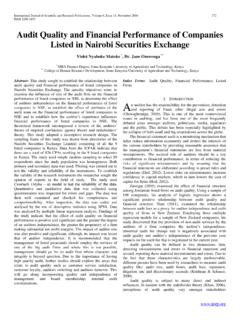Transcription of Contents
1 Contents Executive summary .. 4. Methodology .. 9. Part one: How has disabled people's social care changed since 2010? .. 11. Changes to hours of support since 2010 .. 16. Flexibility and personalisation .. 21. Choice and control .. 25. Part two: What have changes to services meant for outcomes and independence? .. 30. Support for basic needs and independent living .. 30. Work and active citizenship .. 41. social and community participation .. 46. Part three: Improving disabled people's experiences as social care users.
2 52. Direct Payments .. 53. Relationships with care planners .. 55. Consistency of staff and joined-up services .. 56. Assessments and individual contributions .. 58. Awareness and access to information .. 59. Advice and advocacy .. 60. Concluding remarks .. 63. Appendix 1: Sample .. 64. Appendix 2: Survey questionnaire .. 72. 3. Executive summary Introduction Scope conducted research into disabled people's experiences as social care users in England as part of a Disability Partnership with the National Autistic Society, Mencap and Sense.
3 This collaboration is part of the Health and social Care Voluntary Sector Strategic Partnership Programme, funded by the Department of Health, NHS England and Public Health England. While many recent social care research projects have focused on older people's services and experiences as care users, this report shares findings on the views of disabled people aged 18 to 64 who are using social care services in non-residential settings. With the new Care Act introduced on 1st April 2015 amid ongoing debate around how best to support the role of health and social care services, Scope's research offers new insights into the state of care for working age disabled people at a crucial turning point.
4 Scope hopes this report will provide policymakers and practitioners with new insights from people using services to inform the development of more personalised, outcomes focused social care. The report paints a detailed picture of disabled people's recent experiences with the social care system, how far services support disabled people to live, work and participate in their communities, and how services can become better at supporting disabled people to live independently in their communities in the future.
5 Research focused on disabled people's experiences with and views of the care planning process. Scope asked disabled people what the impact of assessments and reviews has been on their opportunities to live independently and achieve the outcomes that are important to them. The research also gives new insights which can inform improvements in the delivery of services. Key findings Just 18% of social care users say services consistently support them to live as independently as possible. 55% say social care never supports their independence.
6 Support is central to the way most disabled people define what independence means to them, and how choice and self-determination are achieved. Many disabled social care users see support as necessary in order to achieve the things that are important to them, fulfil their roles as parents, daughters, sons and friends, and be part of social and economic life. 27% feel services consistently support their day to day living needs, with 38%. saying this never happens. Day to day living needs are more likely to be met through support services than needs around independent living.
7 Support to live as independently as possible also appears to 4. build on support for more basic needs. social care users whose services always meet their day to day living needs are 11 times more likely to say they are also supported to live as independently as possible, compared to social care users who say their needs are only sometimes or never supported. 52% of social care users want more help to be active in their communities, while 30% receive help towards this from social care services. 27% of social care users need more support in their roles as informal carers, compared to 5% who get this help now.
8 79% of social care users say services are important for enabling them to work, seek work, volunteer and study. More than half of social care users under 35 want help with working or jobseeking, but only 15% are currently getting support with working and only 13% are getting support with jobseeking. Some disabled social care users feel excluded from or not accepted by society. Most social care users want and expect to work, volunteer, be part of their local communities, fulfil caring responsibilities and be active in their society.
9 Some social care users feel constrained in their ability to do this, emphasising the important role of care and support services in enabling active citizenship and independent living. Disabled social care users emphasise the importance of formal support to complete daily living tasks and live independently, and the value of formal support as an alternative to support from parents, other family and friends. This is particularly important for younger social care users. 36% of disabled social care users say support has become worse since 2010.
10 19% say support has improved. 29% of social care users say their hours of support have been cut, while 24%. say their hours have been increased. 83% of those whose hours of support have been cut say they now do not get enough support through their care package. social care users who feel that services have become less effective at supporting them since 2010 are most likely to mention reductions in the hours and scope of their care packages when asked why. Those whose hours of support have been reduced since 2010.








